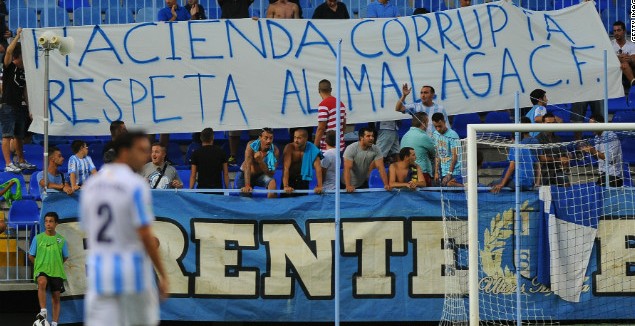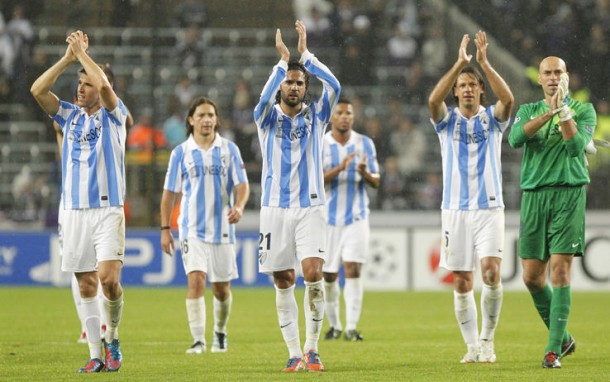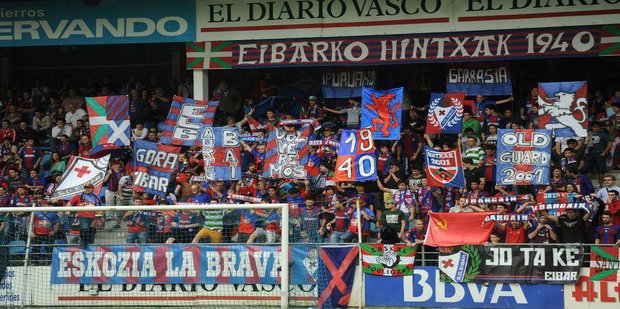Malaga punishment unjust as Uefa continue to operate under their own rules
-
Updated: 28 January, 2013

The Beast, remember him? Fans in England will surely recall the Brazilian journeyman who, built like a steamroller, plied his trade at Arsenal during the 2006-07 season. Julio Baptista arrived at the Emirates Stadium from Real Madrid, in a swap deal that took the unhappy Jose Antonio Reyes back to Spain.
His contribution ranged from the almost comical to the simply sublime. Packing in bumbling appearances alongside such displays as the four-goal thumping of Liverpool in the League Cup. With ‘The Beast’, anything was possible.
These days Baptista is plying his trade at Malaga, a club that shook up up La Liga last season and have been in the headlines yet again this term – both for good and bad reasons. Again, anything is possible
With financial problems, debts to players and other clubs and investors threatening to walk away at the start of the season, the recent story of Malaga has left many shaking their heads in disbelief.
For here is a team who, just four years ago were scratching around in the Segunda Division, now occupy fourth spot in La Liga and find themselves through to the last 16 of their debut season in the Uefa Champions League.
None of what has happened to Malaga in the last four years, makes any sense. Which is where the story of Los Boquerones and The Beast, bear complete resemblance.
Fiscal problems have hit football and bankrupt club sides can now be found across Europe. Despite Malaga’s successful take-over by oil-rich Qatari businessmen, Sheikh Abdullah bin Nasser Al Thani, the club’s story has not been a complete rags-to-riches tale along the lines of Manchester City or PSG of France.
The marriage with its new Arab owners almost ended earlier this season after just two years, when the Sheik threatened to pull-out and end his association with the club.
Forced sales followed and star players such as Santi Carzorla and Salomon Rondon left the club in order to offset the their many financial commitments.
Despite seemingly dragging themselves from the edge of the abyss, the spectre of money problems continue to haunt the club, with creditors still knocking on its door and demanding to be paid. On the field however, the club has punched brilliantly above its weight – most notably in Europe.
Guided by the wizened and much-travelled Chilean Mauricio Pellegrini, Malaga have defied expectation with some outstanding results both domestically and on the continent – proving that last year’s fourth place finish which earned it a first-ever ticket to the glamorous Champions League, was no fluke.
Ironically and sadly, despite its heroics on the field and its much-troubled but determined path to glory, the club is not getting any relief. Especially not from Europen football’s governing body, Uefa.
Just before Christmas, the continent’s governing body ruled Malaga would be banned from one season of European competition, the next time they qualify during the next four years. In addition to this bombshell, if the club do not pay their outstanding debts by 31 March, they will receive an extra season-long ban. Additionally, a handy €300,000 prize money for participating in this year’s Champions League is being withheld.
The news obviously erked all those involved with the club, especially as Malaga are now said to have paid debts owed to a number of clubs – most notably to Osasuna for the transfer of Nacho Monreal. Interestingly, the Pamplona-based club have now offered their support to Malaga.
The Andaluz club have also met with Spain’s tax office, Hacienda, and an agreement has been formulated which will see Malaga repay the reported £8 million they owe in unpaid taxes. Recent reports now even suggest that total may actually be in the region of £4 million.
Nonetheless, Malaga still find themselves facing a crippling ban from European competition, despite the protestations of the club, with suggestions that the ban is part-due to the fact that Malaga have limited assets – the club do not own their La Rosaleda stadium nor their training ground.
All this of course, falls in line with Uefa’s much-talked-about Club Licensing and Financial Fair Play Regulations, otherwise known as FFP.
However, as much as Michel Platini and his friend in Nyon may wish clubs to operate solely on what they earn rather than gouging on petro-dollars, in reality, many will need to take this route if a club is to break the hegemony seen in the likes of Spain’s La Liga and England’s Premier League.
Clubs such as Malaga, a smaller club by tradition compared to the likes of Barcelona, Real Madrid, will always be forced to seek big-money patrons outside of Spain if they are to challenge the established elite.
For going overseas and attracting investors, even if they are oil-sheiks with little knowledge of the economics of running a soccer club, Malaga were left with pretty little choice. If the oil-sheiks suddenly tighten the purse-strings and stem the cashflow, well, it must be part of the risk that comes with such a marriage.
What Uefa should surely take into consideration when punishing clubs for what they see as financial unfair play, are teams’ performances and potential. The FFP should not be a one-size-fit-all package that fails to consider each case on its merits. If so, Uefa would not be practising its sermon on fairplay that it trumpets so zealously.
Clubs such as Malaga have weathered the storm for now and have performed to such a level this season that they even became the first club to qualify for the knockout round of the Champions League – despite the constraints inflicted on them during the summer.
In a Europe long-accustomed to a diet of Champions League winners restricted to a select, wealthy, well-known clutch of clubs rotating the title amongst themselves, fans surely deserve a fresh item on the menu.
Just as we cannot all shop at Harrods, so are long-suffering fans from small clubs entitled to a chance at the big stage if their clubs have earned it.
The punishment from Uefa is a sledgehammer move, threatening to wipe-out Malaga and its fellow-offenders. Uefa ought surely to realize that it is not enough to have the Manchester Uniteds and Real Madrids as its members. It also needs the Malagas of this world to make it truly-representative of European soccer.
The Champions League needs both the sublime skills of Lionel Messi and the clumsy attempts of the ‘The Beast’ to remain the captivating spectacle it has become.







You must be logged in to post a comment Login